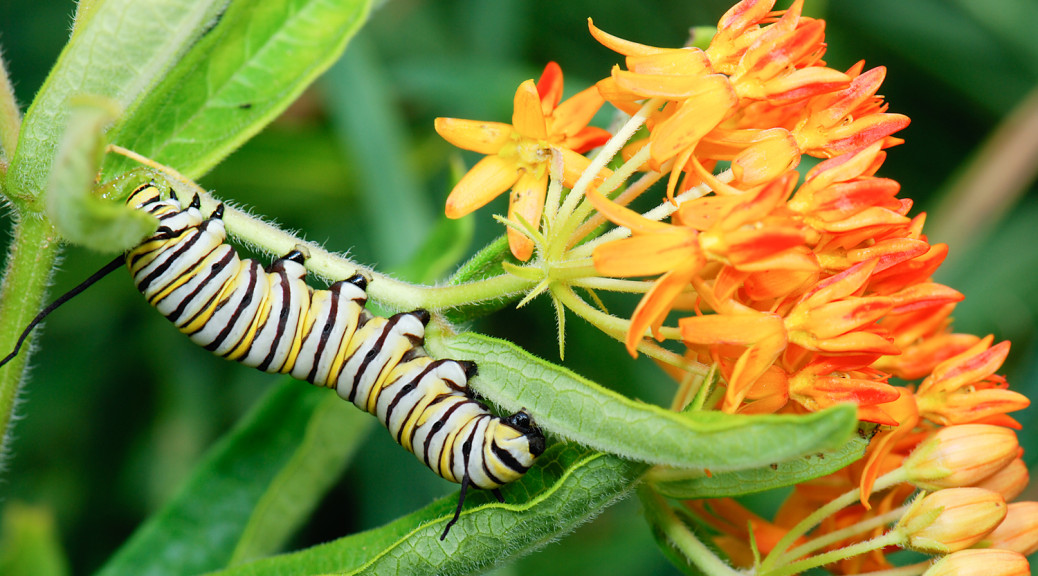With the recent declines in numbers of monarch butterflies leading to the popular insect becoming a candidate for listing as an endangered species, more and more gardeners are thinking about growing milkweed. Milkweed, after all, if the only kind of plant monarch caterpillars can eat, and so growing milkweed in your garden means you’re providing monarchs with a nursery and larder for their young.
But there’s a problem: there are about 140 known species of milkweed, some of them potentially invasive in California wildlands. In fact, not all milkweeds are of equal benefit to monarch butterflies. There’s even some thought that one popular tropical milkweed may be harming North American monarchs by changing their migration habits.
Fortunately, there are fifteen species of California native milkweed that gardeners can choose from to give monarchs a helping hand. Not all of them are readily available in nurseries, but with a little searching you should be able to find at least one species appropriate for your part of the state.


Beware of which species you plant:
http://nativeplantwildlifegarden.com/can-milkweed-be-bad-for-monarchs/
Thx Randi,
Good advice! Many of the milkweed “seed balls” that you may find advertised contain “Tropical Milkweed” (Asclepias curassavica), “Common Milkweed” (Asclepias syriaca) or some of the other species that are NOT NATIVE to California.
If you’re in doubt, it only takes a few seconds to look up “Asclepias” in the USDA database.
When I was a kid, Narrow Leaf Milkweed (Asclepias fascicularis) is what I remember being most common around the SF Bay Area. Now it’s definitely less common, but seeds for this species should still be fairly easy to find.
I just ordered some Heartleaf Milkweed (Asclepias cordifolia) seeds… I finally found them here:
https://www.joyfulbutterfly.com/product-category/butterfly-host-seeds/
If they manage to survive, I’ll share seed with anyone in Sonoma Valley who wants it. If it doesn’t survive, I’ll try my luck with Asclepias fascicularis next year.
Promise to keep you posted on this page.
-Tom
Any luck with the seeds Tom? I am in Napa and looking to start improving the available food for my childhood favorite insect!
-Nathan
Hi Nathan,
Unfortunately none of the Heartleaf Milkweed seeds I planted came up (though most everything else I started that day did). Here’s how Joyful Butterfly responded:
“We haven’t had any trouble with our Heart Leaf Milkweed seeds, so there must of been something that went wrong. They do require a 2 months period of cold stratification, after which they should be planted at a depth of 1/4 inch. They take about 4 weeks to germinate and we had a germination rate of about 50%. I will go ahead and replace your order with a pack of Prestratified seeds this time, so you should plant them within 2 days after receiving them. Hopefully you will have better luck! Your replacement order will be shipped out today. Thank you for your business!”
Unfortunately, my life is busy and I never got a chance to re-seed from the replacement batch. Hopefully I’ll have better luck with these or another variety this season.
Spring 2018 Follow Up: After another failed sprouting attempt, I gave the second (replacement) batch of Heartleaf Milkweed seeds one last chance and guess what… SUCCESS!
I have several starts coming up now and will post pictures when they get big enough to celebrate.
Thanks Joyful Butterfly!
-Tom
SEEKING SEEDS FOR
Aesclepis fasicularis
Aesclepis californica PERHAPS PLANTS ALSO
Aesclepis eriocarpa